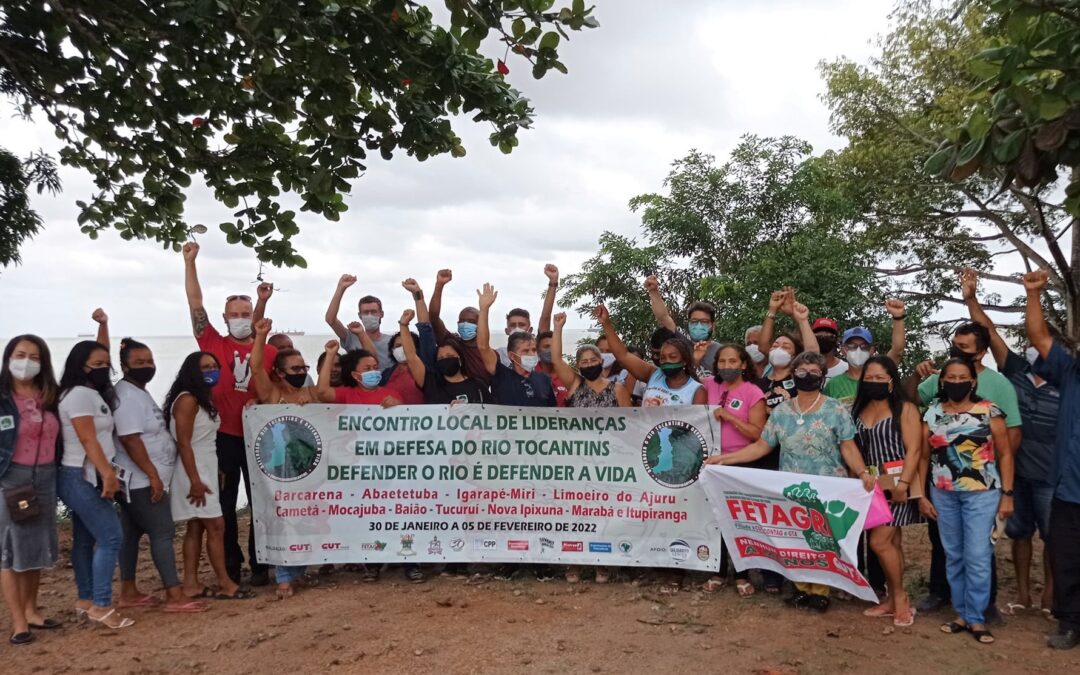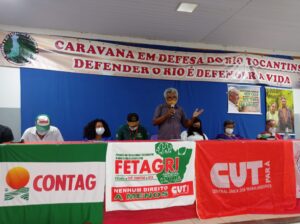
Brazil: Communities & Unions Win Victory for Livelihoods, Democracy
Brazilian communities along a river near the Amazon are celebrating the government’s decision to halt a blasting and dredging project that could destroy their livelihoods and severely damage the environment. Earlier this month, the Public Prosecutor’s Office recommended that the Brazilian Institute of the Environment and Renewable Natural Resources (IBAMA) suspend its preliminary license for the Araguaia-Tocantins waterway project in the state of Pará.
In suspending the license, the government cited the absence of prior consultation with residents who would be impacted, especially Indigenous communities and quilombolas, and the lack of information on the effects of the project on the communities.
The victory “has impacts not just for the local community, but also for the state and even further,” says Carmen Foro, speaking through an interpreter. Foro, a rural activist from the area, is former secretary-general of the Unity Worker Center in Brazil (CUT). “I feel that I and other community members are being heard, that we have opened a dialogue that this project can’t happen without our participation.” (Foro described her community’s fight for survival in a Solidarity Center Podcast episode last year.)
The project would have involved heavy dredging of the Tocantins River and require removing miles of the rocky Pedral do Lourenço river bed to increase navigability during the dry season and facilitate commodity export. IBAMA approved the preliminary license to begin the project in October 2022, ignoring several government agency recommendations.
Key to Success: Mobilizing a Diverse Coalition

Members of the Caravan in Defense of the River Tocantins meet with residents of Nova Ipixuna to discuss a proposed waterway project that threatened livelihoods and the environment. Credit: Amazon Community
“This time in world history, it is really important to connect to the diversity around us,” Foro said. The campaign was victorious because “we created a grand alliance between the unions and with other movements, like quilombos, the Catholic Church, young people, women, fishers. And that alliance is what gave us strength.
“It was a collective struggle.”
These diverse groups, with support from the Solidarity Center, formed the Caravan in Defense of the Tocantins River to raise awareness about the negative impacts of the waterway construction and demand that the government honor international treaties respecting Indigenous and Tribal People’s right to safeguard and manage the natural resources on their lands. They reached thousands of people, through riverside meetings and in online forums.
With its strength in workers’ collective voice, the Brazilian labor movement was well-positioned to respond to the needs of workers and their communities, including the impact of climate change and environmental degradation on jobs and communities. “The unions in those cities are kind of seen as the principal organization in the social movements,” she said. “Along with the CUT, they were able to be an umbrella organization and give us support.”
The Struggle for Democracy Cannot Rest
Foro, who recently was selected by the new administration of President Luiz Inácio “Lula” da Silva to serve in the Ministry of Women, says “many women will be impacted by this project, and through my role now at the Ministry of Women, I plan to be alongside the women who are going to be impacted by this project.”
The license suspension is a huge victory, but the process is not over. “Everyone knows that this recommendation doesn’t resolve the issue,” she says. “The problem is still there and it will be a long journey. There still will be something in the middle between this recommendation.”
While she is hopeful about working with the new administration, whose election with the support of union and community groups opened dialogue with historically marginalized communities along the Amazon, Foro is keenly aware they must work to ensure the democratic process thrives.
“It’s important that we continue the fight, continue the struggle. Even with a democratically elected government that is representative now, there is still pressure that is coming from all different sides. The workers are part of that, but also there is the pressure from large companies, and agro-business as well. We have to continue to fight.”
